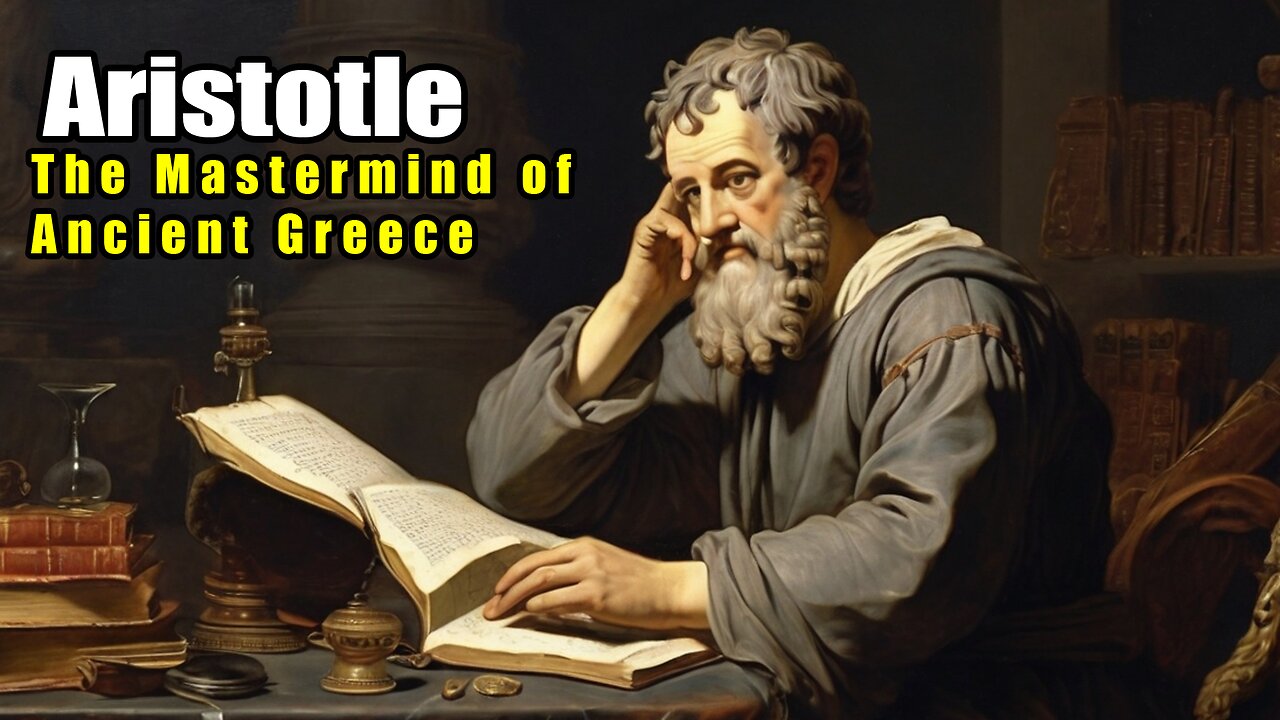Premium Only Content

Aristotle - The Mastermind of Ancient Greece (384 - 322 B.C.)
Aristotle (384 - 322 B.C.) was an ancient Greek philosopher and polymath, one of the most influential figures in Western philosophy. He made significant contributions to various fields, including philosophy, ethics, metaphysics, biology, politics, and more. Here is an overview of Aristotle's life and key contributions:
Early Life:
Birth and Education:
Aristotle was born in 384 B.C. in Stagira, a Greek colony in Macedonia. His father, Nicomachus, was the court physician to King Amyntas of Macedonia.
At the age of 17, Aristotle moved to Athens and joined Plato's Academy, where he studied under Plato for around 20 years.
Contributions to Philosophy:
Metaphysics:
Aristotle's work in metaphysics explored the fundamental nature of reality. He introduced the concept of "substance" and investigated the principles of being and existence.
Epistemology:
Aristotle delved into epistemology, the study of knowledge. His works on logic, particularly the "Organon," were foundational in the development of formal logic.
Ethics:
Aristotle's ethical philosophy, presented in works like "Nicomachean Ethics," emphasized the pursuit of virtue and the concept of the "Golden Mean" as a balance between extremes.
Politics:
In "Politics," Aristotle discussed the nature of governance, different forms of government, and the concept of the "best" political system. He favored a mixed government combining elements of monarchy, aristocracy, and democracy.
Scientific Contributions:
Biology:
Aristotle's work in biology was groundbreaking. He classified animals based on their characteristics and introduced the idea of a "scala naturae" or "Great Chain of Being" that organized living things hierarchically.
Physics:
Aristotle's "Physics" explored the principles of natural philosophy, discussing concepts such as motion, causality, and the nature of the physical world.
Legacy:
Teacher of Alexander the Great:
Aristotle served as the tutor to a young Alexander, who later became Alexander the Great. The education provided by Aristotle had a profound influence on Alexander's worldview.
Writings:
Aristotle's extensive writings cover diverse subjects, including biology, ethics, politics, metaphysics, and poetics. His works have been preserved and studied for centuries.
Peripatetic School:
After leaving Plato's Academy, Aristotle founded his own school in Athens called the Lyceum. His followers, known as the Peripatetics, continued his philosophical tradition.
Influence on Medieval Scholasticism:
Aristotle's works, translated into Latin, played a crucial role in the development of medieval scholastic philosophy. His ideas influenced thinkers like Thomas Aquinas.
Critical Reception:
While highly influential, Aristotle's ideas were not immune to criticism. His views were challenged and revised by later philosophers, but his impact on Western thought persisted.
Aristotle's comprehensive contributions to philosophy and science have had a lasting impact, shaping the intellectual landscape for centuries. His emphasis on empirical observation, logical reasoning, and ethical inquiry laid the foundation for many subsequent developments in Western philosophy and scientific thought.
-
 53:15
53:15
Kimberly Guilfoyle
3 hours agoCalifornia Residents Demand Answers, Live with Rep Vince Fong, Mike Davis, and Paul Peterson | Ep. 188
20.5K14 -
 1:49:51
1:49:51
Redacted News
2 hours agoEMERGENCY! 10 MILLION UNDER FIRE WARNING & 100 MPH WINDS, NEWSOM UNVEILS CALIFORNIA 2.0 PLAN
71.3K72 -
 49:33
49:33
Candace Show Podcast
2 hours agoI Respond To Mr. And Mr. Macron | Candace Ep 131
48.6K61 -
 LIVE
LIVE
Revenge of the Cis
3 hours agoEpisode 1429: Catch And Release
2,303 watching -
 LIVE
LIVE
Film Threat
8 hours agoVERSUS: HOLLYWOOD IS STILL ON FIRE | Film Threat Versus
219 watching -
 12:33
12:33
Silver Dragons
2 hours agoSilver Price Crushed Today - NEW TREND STARTING?
2.27K -
 1:02:03
1:02:03
In The Litter Box w/ Jewels & Catturd
21 hours agoRecall Newscum & Bass! | In the Litter Box w/ Jewels & Catturd – Ep. 718 – 1/13/2025
64.3K24 -
 3:19:58
3:19:58
Tate Speech by Andrew Tate
9 hours agoEMERGENCY MEETING EPISODE 101 - STRENGTH AND HONOR
156K63 -
 1:48:09
1:48:09
The Quartering
5 hours agoLA Fires Are About To Get Way Worse, Trump Vs Vance On J6 Pardons, Brett Cooper Bombshell & More
98.6K37 -
 LIVE
LIVE
Dr Disrespect
6 hours ago🔴LIVE - DR DISRESPECT - MARVEL RIVALS - TOP 500 IN THE WORLD
2,951 watching